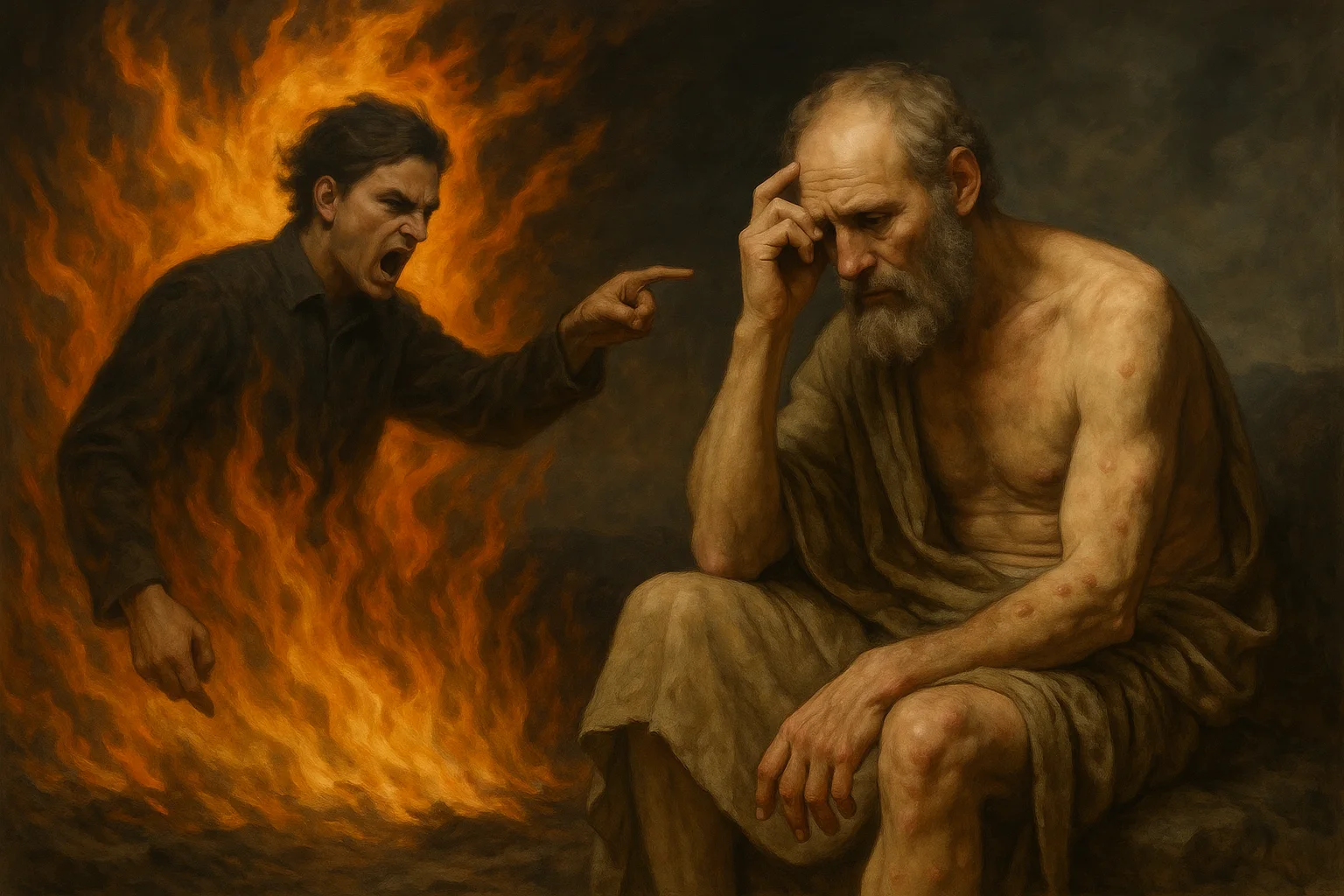Judicial or moral evil?
03-11-2025 - Posted by Geert-JanOriginally posted on July 07, 2006 – by Andre Piet
A clearer statement on the origin of evil than the one we find in Isaiah 45:7 is hardly imaginable. It is YHWH Himself who declares there that He is the Creator of evil. However, this week on the forum, it was repeatedly objected that this concerns only judicial evil, not moral evil. By that, people mean to say: God brings evil upon a sinner as judgment. For example, He sends disease, war, or death. But God does not create moral evil; He has no hand in sins. Such is the reasoning, in which a distinction is made that we do not find in Scripture. The following reasons make this clear.
1. Job is presented in Scripture as a righteous man. Nevertheless, evil befell him. All his possessions were destroyed, his children were taken from him, and finally he was struck with a terrible disease. Yet Job explicitly received this evil from the hand of God (and in doing so did not sin with his lips! – 2:10). Even though this evil reached him through God’s adversary, Job knew that both good and evil are in God’s hand. According to Job’s friends, the evil that came upon him was judicial. But none of them spoke what was right concerning God (Job 42:7).
In short: Job received evil from God, but it was not judicial evil.
2. Behind the moral evil of humans (sins), God’s directing hand is never absent. When Joseph was sold into Egypt, his brothers committed a series of sins. Against God, against Joseph, and against their father – who, for many years, was inconsolable over the loss of his son. The guilt of the brothers was very great. Nevertheless, Joseph later declared through tears that it was not they who had sent him to Egypt, but God Himself (Gen. 45:8). What was sin and guilt on the part of the brothers, turned out – behind the scenes – to be divine direction.
In short: ‘moral evil’ under divine direction.
3. God has enclosed all (= humanity) in stubbornness (Rom. 11:32). The first time this word (“enclosed”) is used (Luke 5:6), it refers to a multitude of fish trapped in a net. There is no escape. Well then, it is God who has enclosed humanity in stubbornness.
Earlier in the letter to the Romans, Paul had already established that Adam’s descendants have been “constituted sinners” (literally: placed or appointed; Rom. 5:19). In both texts we also see that this is not an end in itself, but the necessary path toward the goal. God has enclosed all in stubbornness “that He should be merciful to all.” Similarly, in Rom. 5:19, we read that God has constituted or appoint humanity as sinners, in order – just as sovereignly – to constitute or appoint the entire offspring of Adam as righteous. You and I are sinners, not because we chose to be, but because we were enclosed and appointed to be so – by God.
4. With the genocide in Egypt, Pharaoh heaped great guilt upon himself – without a doubt. Pharaoh repeatedly resisted God’s will (“Let My people go”). When Egypt came under immense pressure from the dreadful plagues, Pharaoh finally seemed about to give in. Finally, God’s goal reached… Wrong! God strengthened (in Greek: hardened) Pharaoh’s heart precisely so that Pharaoh would continue to say ‘no’. Why? Because only through opposition (moral evil) could God demonstrate His power (Rom. 9:17). Pharaoh did indeed resist God’s will – but not God’s counsel (Rom. 9:19 – the word “will” there should be translated “counsel,” see Eph. 1:11). This makes it clear that even the most horrifying sin takes place according to God’s counsel and plan. The most ultimate example of this is, of course, the cross of Golgotha (Acts 2:23).
5. In Psalm 105:25 we read:
“He (YHWH God) turns their (Egyptians) heart to hate His people (Israel), To act craftily against His servants.” (Ps. 105:25)
YHWH Himself was the directing hand behind the terrible antisemitism in Egypt. I am not claiming that – it’s written plainly in this verse from the Psalms. The Egyptians were guilty of hatred toward God’s people, yet God is revealed to be the Director behind it all.
God is not only at the beginning and the end of history. History itself is His Story. He holds all the strings (indeed, as if He were a …)
“Seeing that OUT of Him (> the beginning)
and THROUGH Him (> the process)
and TO Him (> the end) is all:
to Him be the glory for the eons! Amen!”
(Rom. 11:36)

 English Blog
English Blog